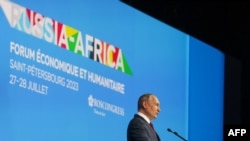Speaking at the two-day summit devoted to strengthening relations, Putin said Russia was expecting a record grain harvest this year and was ready to replace Ukrainian grain exports to Africa on both a commercial and aid basis and honor what he said was Moscow's critical role in global food security.
"We will be ready to provide Burkina Faso, Zimbabwe, Mali, Somalia, Central African Republic and Eritrea with 25-50,000 tons of free grain each in the next 3-4 months," Putin told the summit, whose participants reacted with applause.
"We will also provide free delivery of these products to consumers."
Zimbabwean President Emmerson Mnangagwa said that his country was food-secure but was grateful for an offer of free grain from Putin.
"We are grateful," Mnangagwa told reporters at the summit. "We are not in any grain deficit at all. We are food-secure, he is just adding to what we are already have."
The event, which is expected to see various agreements signed, follows Moscow’s first Russia-Africa summit in 2019 and is part of a concerted push for influence and business on a continent where mercenaries from Russia's Wagner Group remain active despite an abortive mutiny at home last month.
Responding to Western criticism of Russia's decision to quit the Black Sea grain deal last week, an arrangement which allowed Ukraine to safely export its grain, Putin reiterated that Moscow left because none of the promises it was given about facilitating its own grain and fertilizer exports had been met.
Some Western politicians have said Russia's exit is irresponsible and will result in the suffering of millions of people in poor countries.
But Putin told the summit that over 70% of Ukrainian grain exported thanks to the now lapsed deal had gone to high-income or above-average income countries, including in the European Union, and that poor countries like Sudan had been "screwed over" and received less than 3% of the shipments.
He said Western sanctions, imposed over Russia's war in Ukraine which it calls a "special military operation," had even prevented Russia from supplying free fertilizers to poor nations.
"A paradoxical picture is emerging. On the one hand, Western countries are obstructing supplies of our grain and fertilizers (via sanctions), while on the other they hypocritically blame us for the current crisis situation on the world food market," said Putin.
Russia says 49 of the continent's 54 states are represented at the St. Petersburg summit, including 17 by their heads of state and four by heads of government.
That is fewer than half the number of leaders who took part in the last such event in 2019 — a fall that the Kremlin has blamed in part on what it called "brazen" efforts by the United States, France and other countries to dissuade leaders from attending.
The summit program includes an array of panel discussions on topics ranging from security, nuclear energy and artificial intelligence to education and sports.
Visiting dignitaries are also invited to visit Russia's imperial palaces or watch a gala match between Russian and African "football legends."


Forum